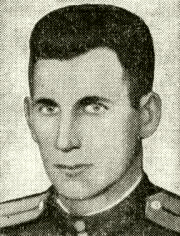
Semion Sholomovich Gurevich
Semion Gurevich was born in 1915 in Ihumen (now Cherven, Belorussia). Despite the fact that official documents list the occupation of his father Sholom as a peasant, under Bolshevik rule Sholom served in the "militia", i.e. newly established Soviet police. In 1920 or in 1921, as a five-year old, Semion witnessed a pogrom perpetrated by some anti-Communist "bandits." This tragic event left its marks on Semion: a scar on his body and a nervous tic on his face, for the rest of his life.
Semion Gurevich graduated only seven classes of school and, hence, was regarded as only semi-educated. Therefore, he served in the Red Army (he was drafted in 1936) as a private. Serving in the cavalry, he took part in the Soviet annexation of Eastern Poland (Western Belorussia and Western Ukraine) in September 1939. He was demobilized and, prior to the Soviet-German war, married and had a son.
Gurevich was drafted and sent to the front in June 1941, at the beginning of the Soviet-German war, again with the rank of a private. He fought in Belorussia and took part in the Red Army retreat. In 1942, Gurevich was sent to a cavalry school and, after completing it in February 1943, he was assigned as the commander of a communication platoon to a cavalry division, with the rank of lieutenant. In the summer of 1943, he fought in central Russia (Orel and Briansk), where he was wounded. After being released from the hospital, he became the commander of a separate communication unit (a company).
Gurevich distinguished himself during the crossing of the Dnieper River in southeastern Ukraine (in the area of Dneprodzerzhinsk) in September 1943. On the night of September 24/25, Lieutenant Gurevich and four other soldiers left by boat to stretch a telephone cable across the Dnieper. They had to fulfill this operation under enemy fire. One of the soldiers was killed and the boat was sunk after being hit by a mortar shell. Gurevich and his men had to pull the cable while swimming. A short time after the soldiers reached the opposite shore and attached the cable to a point on the western bank of the Dnieper, they were attacked by the Germans and had to fight the enemy as common infantry soldiers. Finally, the enemy attack was repulsed.
On September 27, when the Red Army First Regiment forced its way across the Dnieper, the Germans attempted to surround it. First they cut the communications. Once more Gurevich and his men were sent to repair the cable, encountered a German unit, and withstand a heavy, two-hour long, battle against the enemy. Gurevich was wounded several times, but continued to fight. By himself he killed several Germans and the Soviet communications were restored. After the forcing of Dnieper, Gurevich was awarded the title of Hero of the Soviet Union.
In 1944-45, Gurevich fought in Poland.
After the war, Semion Gurevich returned to Minsk. He died in 1982.
